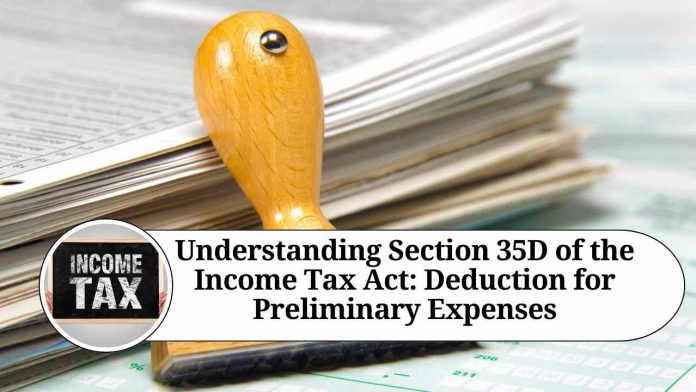INTRODUCTION
According to Section 35D, any expenditure incurred before the commencement of business or profession is treated as preliminary expenses. These expenses are incurred to bring into existence the business or profession, and they are necessary for starting the business.
However, these expenses cannot be treated as revenue expenditure as they do not result in the creation of any tangible or intangible asset. Hence, Section 35D allows for the amortization of these expenses over a period of time.
The amount of preliminary expenses that can be amortized is limited to 5% of the total cost of the project or Rs.5,00,000, whichever is less. This means that if the total cost of the project is Rs. 1,00,00,000, then the maximum amount that can be claimed as a deduction for preliminary expenses is Rs. 5,00,000.
The amortization of preliminary expenses is allowed over a period of 5 years from the commencement of business or profession. This means that if the business or profession starts on 1st April 2023, then the preliminary expenses can be amortized till 31st March 2028. The amount of amortization that can be claimed in each year is calculated by dividing the total preliminary expenses by 5.
It is important to note that the deduction for preliminary expenses can only be claimed if the business or profession is actually commenced. If the business or profession is not commenced within 3 years from the end of the financial year in which the expenses were incurred, then the deduction for preliminary expenses cannot be claimed.
The rationale behind allowing the amortization of preliminary expenses is to provide relief to businesses and professionals who incur significant costs in setting up their operations. Such expenses are typically incurred before the business starts generating any revenue, and hence, they can put a strain on the cash flow of the business. By allowing for the amortization of these expenses, businesses and professionals can spread out the cost over a period of time, and this can help them manage their cash flow more effectively.
It is important to note that not all types of expenses can be treated as preliminary expenses. For example, expenses that are incurred after the commencement of business or profession cannot be treated as preliminary expenses. Similarly, expenses that are incurred for the acquisition of an existing business or profession cannot be treated as preliminary expenses.
To claim the deduction for preliminary expenses, the taxpayer needs to file Form 3CD along with the income tax return. The Form 3CD needs to be certified by a chartered accountant, and it needs to contain details of the preliminary expenses incurred and the amount of amortization claimed.
Other Related Blogs: Section 144B Income Tax Act
Frequently Asked Questions (FAQs)
Q: What are preliminary expenses?
A: Preliminary expenses are those expenses that are incurred before the actual start of the business or profession. These expenses are typically incurred for the purpose of setting up the business or profession, and they may include expenses such as legal fees, registration fees, consultancy fees, market research expenses, and so on.
Q: Can all types of expenses be treated as preliminary expenses?
A: No, not all types of expenses can be treated as preliminary expenses. For example, expenses that are incurred after the commencement of business or profession cannot be treated as preliminary expenses. Similarly, expenses that are incurred for the acquisition of an existing business or profession cannot be treated as preliminary expenses.
Q: What is the maximum amount of preliminary expenses that can be claimed as a deduction?
A: The amount of preliminary expenses that can be claimed as a deduction is limited to 5% of the total cost of the project or Rs.5,00,000, whichever is less.
Q: How is the amortization of preliminary expenses calculated?
A: The amortization of preliminary expenses is allowed over a period of 5 years from the commencement of business or profession. The amount of amortization that can be claimed in each year is calculated by dividing the total preliminary expenses by 5.
Q: Can the deduction for preliminary expenses be claimed if the business or profession is not commenced?
A: No, the deduction for preliminary expenses can only be claimed if the business or profession is actually commenced within 3 years from the end of the financial year in which the expenses were incurred.
Q: How do I claim the deduction for preliminary expenses?
A: To claim the deduction for preliminary expenses, the taxpayer needs to file Form 3CD along with the income tax return. The Form 3CD needs to be certified by a chartered accountant, and it needs to contain details of the preliminary expenses incurred and the amount of amortization claimed.
Q: Can the deduction for preliminary expenses be carried forward to subsequent years?
A: No, the deduction for preliminary expenses cannot be carried forward to subsequent years. It needs to be claimed in the year in which the business or profession is commenced.
Q: Is there a time limit for claiming the deduction for preliminary expenses?
A: Yes, the deduction for preliminary expenses needs to be claimed within the prescribed time limit for filing the income tax return. If the return is filed after the due date, then the deduction may not be allowed.





















There are some intriguing points on time here but I do not know if I see they all center to heart. There is some validity but I most certainly will take hold opinion until I check into it further. Excellent post , thanks and that we want far more! Added to FeedBurner in addition
I think your blog is getting more and more visitors.:.::;